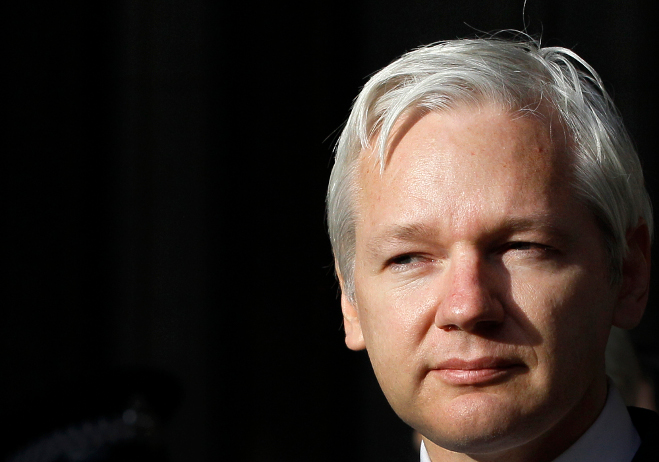
SNOWDEN DOCUMENTS REVEAL COVERT SURVEILLANCE AND PRESSURE TACTICS AIMED AT WIKILEAKS AND ITS SUPPORTERS
Glenn Greenwald and Ryan Gallagher

Top-secret documents from the National Security Agency and its British counterpart reveal for the first time how the governments of the United States and the United Kingdom targeted WikiLeaks and other activist groups with tactics ranging from covert surveillance to prosecution.
The efforts – detailed in documents provided previously by NSA whistleblower Edward Snowden – included a broad campaign of international pressure aimed not only at WikiLeaks founder Julian Assange, but at what the U.S. government calls “the human network that supports WikiLeaks.” The documents also contain internal discussions about targeting the file-sharing site Pirate Bay and hacktivist collectives such as Anonymous.
One classified document from Government Communications Headquarters, Britain’s top spy agency, shows that GCHQ used its surveillance system to secretly monitor visitors to a WikiLeaks site. By exploiting its ability to tap into the fiber-optic cables that make up the backbone of the Internet, the agency confided to allies in 2012, it was able to collect the IP addresses of visitors in real time, as well as the search terms that visitors used to reach the site from search engines like Google.
Another classified document from the U.S. intelligence community, dated August 2010, recounts how the Obama administration urged foreign allies to file criminal charges against Assange over the group’s publication of the Afghanistan war logs.
A third document, from July 2011, contains a summary of an internal discussion in which officials from two NSA offices – including the agency’s general counsel and an arm of its Threat Operations Center – considered designating WikiLeaks as “a ‘malicious foreign actor’ for the purpose of targeting.” Such a designation would have allowed the group to be targeted with extensive electronic surveillance – without the need to exclude U.S. persons from the surveillance searches.
In 2008, not long after WikiLeaks was formed, the U.S. Army prepared a report that identified the organization as an enemy, and plotted how it could be destroyed. The new documents provide a window into how the U.S. and British governments appear to have shared the view that WikiLeaks represented a serious threat, and reveal the controversial measures they were willing to take to combat it.
In a statement to The Intercept, Assange condemned what he called “the reckless and unlawful behavior of the National Security Agency” and GCHQ’s “extensive hostile monitoring of a popular publisher’s website and its readers.”
“News that the NSA planned these operations at the level of its Office of the General Counsel is especially troubling,” Assange said. “Today, we call on the White House to appoint a special prosecutor to investigate the extent of the NSA’s criminal activity against the media, including WikiLeaks, its staff, its associates and its supporters.”
Illustrating how far afield the NSA deviates from its self-proclaimed focus on terrorism and national security, the documents reveal that the agency considered using its sweeping surveillance system against Pirate Bay, which has been accused of facilitating copyright violations. The agency also approved surveillance of the foreign “branches” of hacktivist groups, mentioning Anonymous by name.
The documents call into question the Obama administration’s repeated insistence that U.S. citizens are not being caught up in the sweeping surveillance dragnet being cast by the NSA. Under the broad rationale considered by the agency, for example, any communication with a group designated as a “malicious foreign actor,” such as WikiLeaks and Anonymous, would be considered fair game for surveillance.
Julian Sanchez, a research fellow at the Cato Institute who specializes in surveillance issues, says the revelations shed a disturbing light on the NSA’s willingness to sweep up American citizens in its surveillance net.
“All the reassurances Americans heard that the broad authorities of the FISA Amendments Act could only be used to ‘target’ foreigners seem a bit more hollow,” Sanchez says, “when you realize that the ‘foreign target’ can be an entire Web site or online forum used by thousands if not millions of Americans.”
GCHQ Spies on WikiLeaks Visitors
The system used by GCHQ to monitor the WikiLeaks website – codenamed ANTICRISIS GIRL – is described in a classified PowerPoint presentation prepared by the British agency and distributed at the 2012 “SIGDEV Conference.” At the annual gathering, each member of the “Five Eyes” alliance – the United States, United Kingdom, Canada, Australia and New Zealand – describes the prior year’s surveillance successes and challenges.
In a top-secret presentation at the conference, two GCHQ spies outlined how ANTICRISIS GIRL was used to enable “targeted website monitoring” of WikiLeaks (See slides 33 and 34). The agency logged data showing hundreds of users from around the world, including the United States, as they were visiting a WikiLeaks site –contradicting claims by American officials that a deal between the U.K. and the U.S. prevents each country from spying on the other’s citizens.
The IP addresses collected by GCHQ are used to identify individual computers that connect to the Internet, and can be traced back to specific people if the IP address has not been masked using an anonymity service. If WikiLeaks or other news organizations were receiving submissions from sources through a public dropbox on their website, a system like ANTICRISIS GIRL could potentially be used to help track them down. (WikiLeaks has not operated a public dropbox since 2010, when it shut down its system in part due to security concerns over surveillance.)
CONTINUE READING AND READ THE DOCUMENTS
